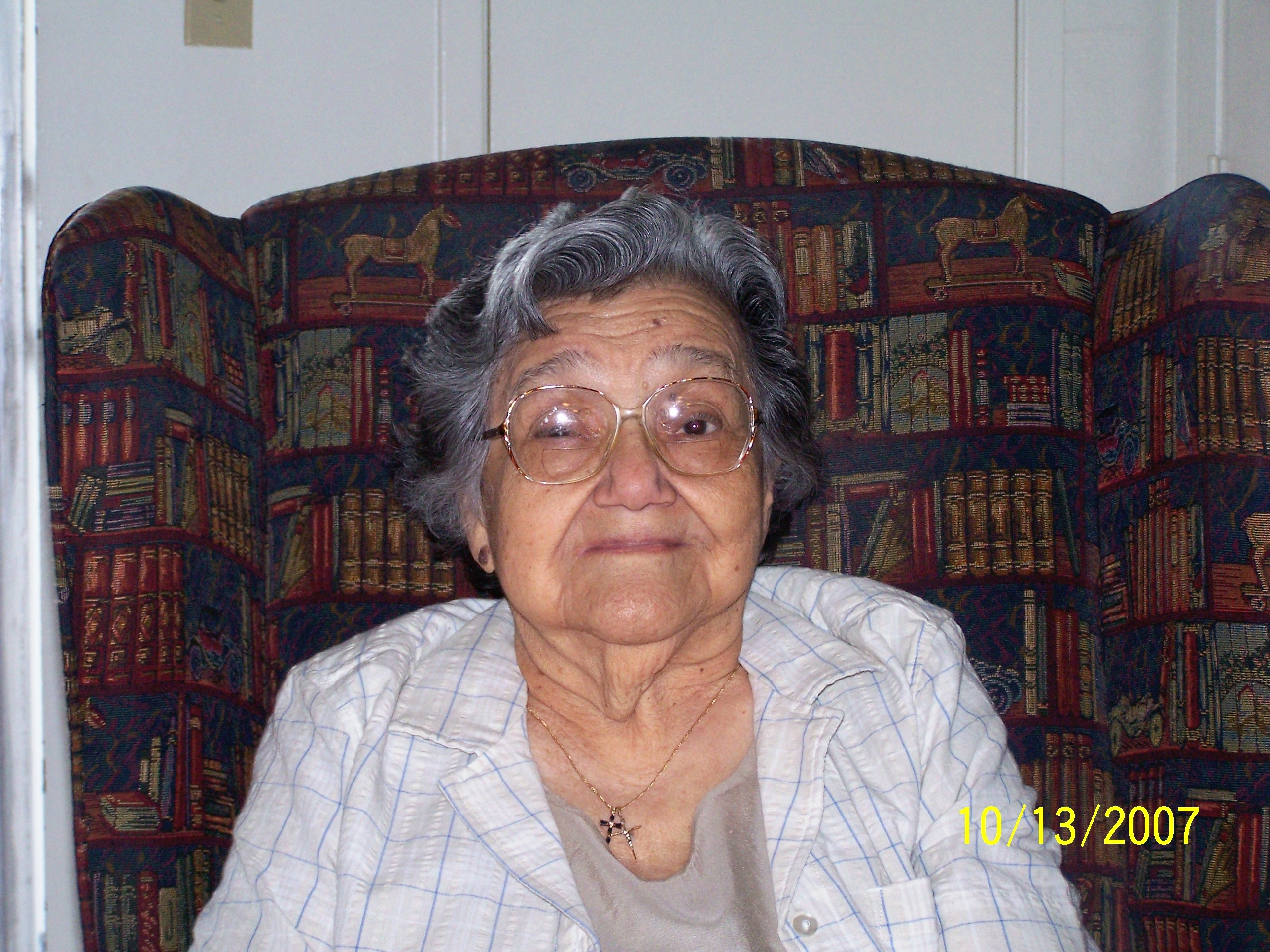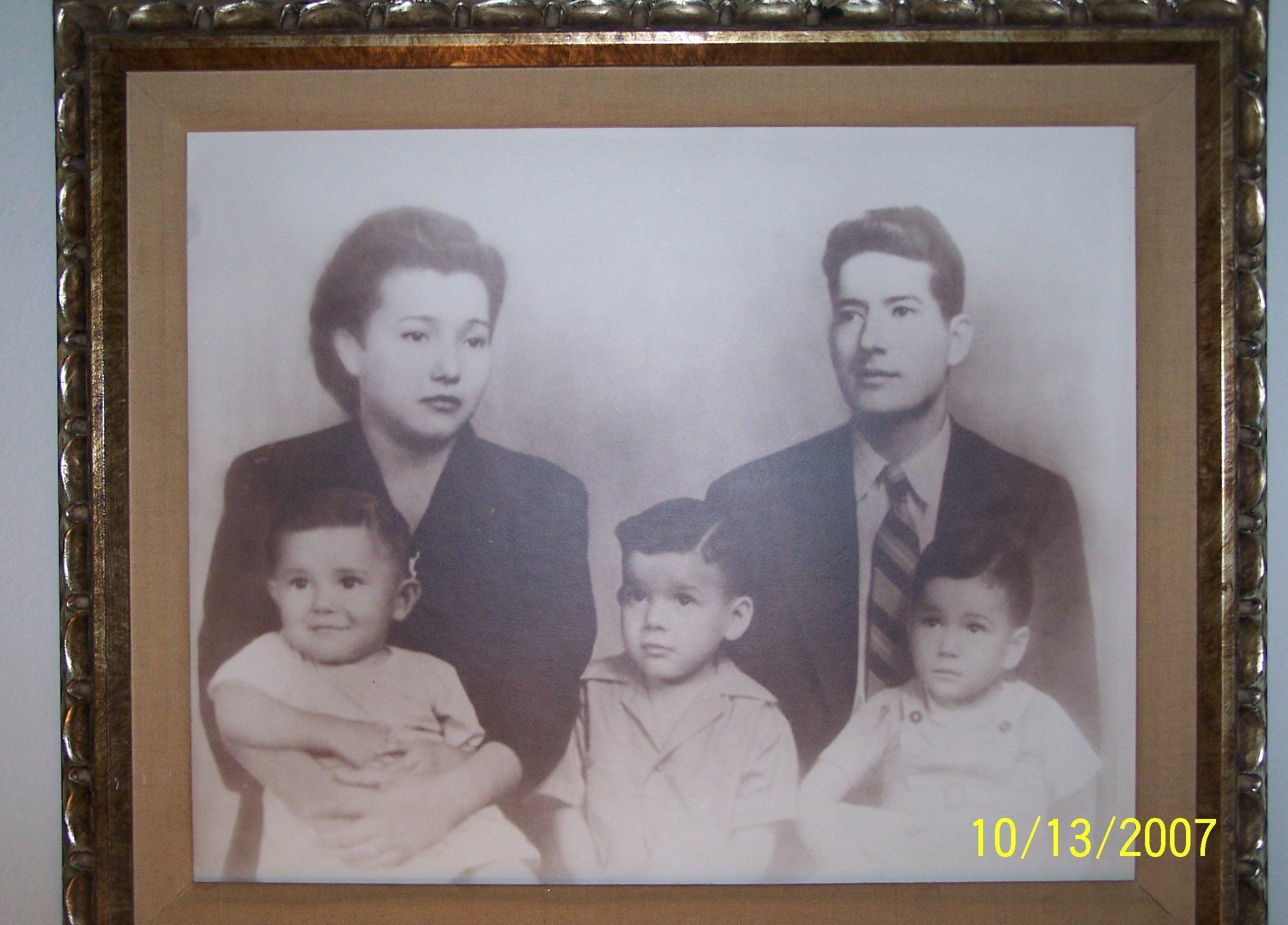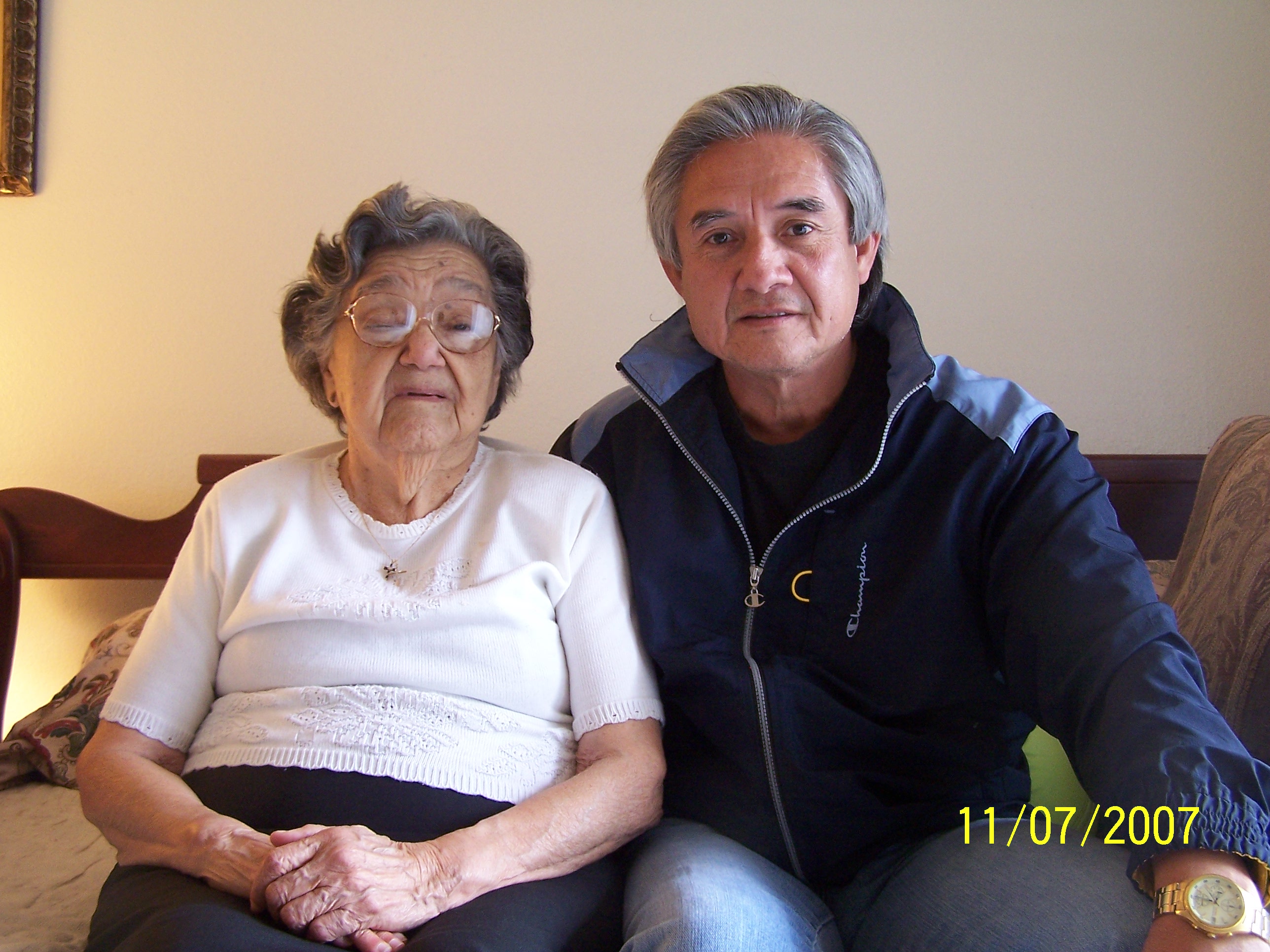Irene Cano (nee De La Garza)





How long did you live in Lopeno?
We were there for about 4 to 5 years. Yes because I'm about four and a half years older than my sister Ester and she was born there. Then Ester was about 7 year old when we return to live in Laredo again. You understand?

Of your brother and sisters, who was born in Austwell?
Oh, the oldest, Mage, Concha, and myself. The three of us only and then Ester was born in Lopeno. Now a day Lopeno is ….. I think they removed it, I don't know what they did with it.
What was it a ranch or town?
It was somewhat of a small town/ranch. You understand? It was by the river. Then latter, during the flood, do you remember the flood? What year? Well Beto (my younger brother) and Rolando (one of her sons) were babies. That flood was in 1954. (We now started a discussion about when my siblings and cousins were born)
Do you remember anything about Lopeno?
I do remember Lopeno. I remember real well the store that my father ran. That is what father went to do in Lopeno, to run the store. I remember that the river was there and mom used to go to wash clothes and we would swim by the edge. The Rio Grande passed through there. During those days there was always….well during those days they passed bottles. They passed contraband of bottles to sell. I barely remember since I was only a little girl but I remember people talked.
Did you see the man coming across?
No, they passed during the night. But we talked and we still talk about things that happen. That is why Mine (my mother her sister) and I still talk a lot remembering. She now knows a lot from me. I tell your mother, when you and Chelo were born, we didn't know until next day because we were asleep and you were born during the night. I do remember when Maria Hilda was born. I remember Mom telling me to go to…. do you remember Don Helario? No. Remember the little house at the back of mom's house? Yes. Well, Don Helario lived there. (I told her about an incident that happened to me as a child where bees from a bee hive on the house had stung me. I told her that her mother my grandmother had treated me) I didn't hear of that one. You know I never took my children to the doctor. My mom was our doctor. I remember she would treat them for Del Susto, Del Ojo, and Del Pacho. They would get diarrhea and she would treat them. She was my doctor. Well Dona Teresita left that small house to mom so that Don Helario could live there. Dona Teresita and Mom were very good friends. Was this old man a relative? No he was just a friend and Dona Teresita was a very close friend of Mom. Anyway, she told me to go to see Dona Teresita and tell her that the hour was here. I asked mom, "the hour of what"? You just go and tell her what I said. She knows. You remember your Grandmother; she only said things once you know. Yes I know. I went and told Dona Teresita that mom said that her hour had come. She replied with ha "OH YEA"? I guess mom and her had an agreement that she would send word when it was time. She was the doctor's assistance. So she came back with me to the house and then I, Concha, Mage and Lupe stayed outside. They made us stay outside until the Doctor came and brought mine. No, it was Maria Hilda who was born during the day.
Was Dona Teresita a midwife or just a helper?
No, she was just the helper to the doctor. Like my mother was the helper to the doctor whenever all of you were born she also was a helper. You know Kiko (my nickname as a child) sometimes I get sleepy and I start thinking of her. She was a very strict person and a very hard worker. I remember she would take care of all of us. She would bathe us, feed us and wash our clothes in a scrubber. There were no washing machines during those days. She worked a lot for all of us. Like I tell you, there were three of you that were born there right? No four. And I had three that were born there. I remember that when Eddie (her third child) was born there I already had two small children. She would feed everyone. She had her own children and then my babies and everyone else.
I stop and think: where did she get all that energy? Yes she would take care of everyone's children and she would make tortillas and all that food for everyone and she would make enough.
When you moved to Laredo did your mother have a washing machine?
She laughed and said Kiko my poor mother never had machines until way later in her life. She did everything by hand. We all had to use an outside restroom. My mother was very clean. She would clean the toilet with soap (lejia) and she used a baking substance (cal) for the smell.
When your family returned to Laredo, where was your father working?
He worked in the railroad for a while but not long. He then bought a yard at 12 Galveston Street and started working in the insurance company. He started working for Prudential. He worked over 40 years with them. When he first started he didn't know English but by the end he was the superintendent. I have a picture of him at the end of his career with all his workers. I'll look for it and let you see it.

Can you tell me the name of all your brothers and sisters starting from the eldest to the youngest?
Amado Mayorga. He was from an earlier marriage. Mom had married at a very young age. He was born in Skidmore Texas. He was the oldest. Later it was Lupe, then Mague, then Concha, then me, then Ester, then Mine, then Chelo, and Maria Hilda. Did I get all of us? We were nine. Yes I did. Mom had two children from her first marriage, Amadito and Lupe. When her first husband died, she had Amadito and was pregnant with Lupe. Later on when we moved to Laredo, Amadito decided to stay with his grandparents in Skidmore, Texas while Lupe still a baby went with us.
How did your mother meet your father?
My grandfather, my dad's father had a ranch/farm in Austwell, Texas. My mother along with her sisters and brothers went to work in the field in the ranch. Most of the people working in the fields were from Mexico. My father the owner's son met my mom and fell in love. Not only them but my mother's sister met my father's brother and they fell in love and also got married. The two brothers married the two sisters. Just look at mom's luck, in her first marriage, her brother married her husband sister. In this case, it was sister to brother and brother to sister.
What games did you play when you were a child?
You're going to laugh when I tell you. In the first place my dad would tell us because we were all girls, that we had to learn how to become "ama the casa" house wife because during those days that's all a woman would do. We would gather with the neighborhood kid and play the bebeleche. A game played on the street where we made block on the ground and we would jump. I forgot what they call it in English. We also would play a game that we would divide the kid in two groups. One group would hold hand and they would dare a kid from the other group to come over to try to break their grip. A kid would run and jump on their grip and if they were unable to break any of their grip then they would now belong to that group. They would take turns doing this and the group that had the most of the kids at the end would win. We had something we called out but I forgot. We would also jump rope. The lady from the neighborhood would come to visit with mom in our front porch. We had the largest front porch so the ladies would visit and the kid would play on the street. Little games you know.
What schools did you go to?
Mom sent us to school with the nuns. We spent a lot of time at this school because it was free. They would teach us everything. My sister even learned to play a piano. We learned to read and write and even to wash dishes because we would eat there and we would help the nuns in picking up. It was like a child care but they would teach us everything. Mom thought that the childcare was accredited but it was not so I started in another school at 8 years. I went to Christian Junior High for my 7th grade and got out a year later. Later when I was older I got my GED.

My view of the topic "Life in South Texas" did not change. I've always been proud to have lived here and my positive thoughts were just reinforce through the interview. I found my aunt reminiscing of those old times and she would suddenly sadden and then she would seem happy. I felt I was taking her through a roller coaster of both bad and happy memories. She would take me back in her memories to when I was a child. I found this to be very enjoyable and somehow satisfying. When I heard myself for the first time in the recording it sounded like a child talking to his aunt. It just didn't sound like me. As an interviewer I probably stunk since at times I was so excited about our conversation that I would lose control and not allow her to answer. I've learned through this interview that we all are rich in memory.
I was able to verify most of the stories in the interview with my mother. There were portions that my aunt could not remember so she would ask me to call her sister my mother. My mother got interested in the interview by also reminiscing of the past. They even brought my father into the conversation. I found this project to be very beneficial to all concerned. The benefits are that this small history of this lady will not be forgotten. All people should not be forgotten and to me this is the major benefit to all oral history projects. The only drawback is that some people are very private and they might not like to have their past exposed. This is strictly a personal view. Personally I've learned thing of my family through my aunt's memories that I would otherwise not know. It brought tears to my eyes when she would talk of what she held dear to her. I can sincerely say that I could not find any negative aspect to doing this project.
Finally, I think that learning our past through different views as we did in our oral projects is a very good way to preserve our history. The people we interview were there and it's first hand information. Most writers depend on what they hear and on public records to write a historic event. To me this is prejudice and does not really reflect what might have happened. They as a result are bias to their findings.
The Handbook of Texas Online is a multidisciplinary encyclopedia of Texas history, geography, and culture sponsored by the Texas State Historical Association and the General Libraries at UT-Austin. It was produced in partnership with the College of Liberal Arts and the General Libraries at the University of Texas at Austin. Copyright © The Texas State Historical Association.
Mapquest is a website that provides maps for travel. Map was used to pinpoint where Irene lived in South Texas. "A" marker indicates Austwell Texas where she was born, then "B" marker indicates Lopeno Texas the second place she lived and "C" marker indicates Laredo Texas the third place she lived.
Lopeno, Texas was moved due to the creation of Falcon Lake. Texas Escapes websites explains this event.
Tlahui-Medic. Not. 18, II/2004 Mexico, in October, 2003. This site explains the empacho, evil eye, fright, stream of sore throat, cold and hot medicinal plants, and clean in the village of Ahuatepec.
Federacion Mexicana De Jueggos Y Deporte Autoctonons Y …. Website of Mexican children's games.
Photographs and/or documents on this website were provided by Irene Cano and Jose F. Martinez Jr. First picture is of Irene Cano taken by Jose F. Martinez at the present time at her apartment in San Antonio. The Second picture is a portrait taken in 1942 of her with her first husband Candelario Flores and their first three children, Cande, Tonio, and Eddie. Jose F. Martinez took a picture of the actual portrait handing in her living room at her apartment in San Antonio. The next document is Irene's Certificate of Baptism. This document was not the original. She had gotten a duplicate in 1983 for travel outside of the USA. The last document is her General Educational Development (GED) which she earned in 1985 at the age of 63 years. She had driven my nephew to take the exams when while waiting she inquired on how she could earn her diploma. They provide her with all information and she started school. Later she past the required five exams and was provided with this certificate of completion.